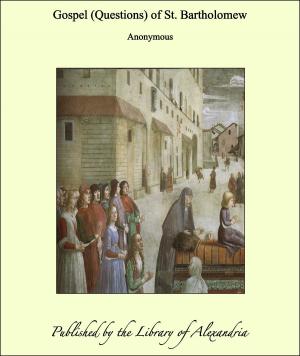The World's Greatest Books (Miscellaneous Literature)
Nonfiction, Religion & Spirituality, New Age, History, Fiction & Literature| Author: | Various Authors | ISBN: | 9781465603333 |
| Publisher: | Library of Alexandria | Publication: | March 8, 2015 |
| Imprint: | Language: | English |
| Author: | Various Authors |
| ISBN: | 9781465603333 |
| Publisher: | Library of Alexandria |
| Publication: | March 8, 2015 |
| Imprint: | |
| Language: | English |
Addison's "Spectator" is one of the most interesting books in the English language. When Dr. Johnson praised Addison's prose, it was specially of "The Spectator" that he was speaking. "His page," he says, "is always luminous, but never blazes in unexpected splendour. His sentences have neither studied amplitude nor affected brevity; his periods, though not diligently rounded, are voluble and easy. Whoever wishes to attain an English style, familiar but not coarse, and elegant but not ostentatious, must give his days and nights to Addison." Johnson's verdict has been upheld, for it is chiefly by "The Spectator" that Addison lives. None but scholars know his Latin verse and his voluminous translations now. His "Cato" survives only in some half-dozen occasional quotations. Two or three hymns of his, including "The spacious firmament on high," and "When all Thy mercies, O my God," find a place in church collections; and his simile of the angel who rides upon the whirlwind and directs the storm is used now and again by pressmen and public speakers. But, in the main, when we think of Addison, it is of "The Spectator" that we think. Recall the time when it was founded. It was in the days of Queen Anne, the Augustan age of the essay. There were no newspapers then, no magazines or reviews, no Parliamentary reports, nothing corresponding to the so-called "light literature" of later days. The only centres of society that existed were the court, with the aristocracy that revolved about it, and the clubs and coffee-houses, in which the commercial and professional classes met to discuss matters of general interest, to crack their jokes, and to exchange small talk about this, that and the other person, man or woman, who might happen to figure, publicly or privately, at the time. "The Spectator" was one of the first organs to give form and consistency to the opinion, the humour and the gossip engendered by this social contact.
Addison's "Spectator" is one of the most interesting books in the English language. When Dr. Johnson praised Addison's prose, it was specially of "The Spectator" that he was speaking. "His page," he says, "is always luminous, but never blazes in unexpected splendour. His sentences have neither studied amplitude nor affected brevity; his periods, though not diligently rounded, are voluble and easy. Whoever wishes to attain an English style, familiar but not coarse, and elegant but not ostentatious, must give his days and nights to Addison." Johnson's verdict has been upheld, for it is chiefly by "The Spectator" that Addison lives. None but scholars know his Latin verse and his voluminous translations now. His "Cato" survives only in some half-dozen occasional quotations. Two or three hymns of his, including "The spacious firmament on high," and "When all Thy mercies, O my God," find a place in church collections; and his simile of the angel who rides upon the whirlwind and directs the storm is used now and again by pressmen and public speakers. But, in the main, when we think of Addison, it is of "The Spectator" that we think. Recall the time when it was founded. It was in the days of Queen Anne, the Augustan age of the essay. There were no newspapers then, no magazines or reviews, no Parliamentary reports, nothing corresponding to the so-called "light literature" of later days. The only centres of society that existed were the court, with the aristocracy that revolved about it, and the clubs and coffee-houses, in which the commercial and professional classes met to discuss matters of general interest, to crack their jokes, and to exchange small talk about this, that and the other person, man or woman, who might happen to figure, publicly or privately, at the time. "The Spectator" was one of the first organs to give form and consistency to the opinion, the humour and the gossip engendered by this social contact.















